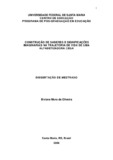| dc.creator | Oliveira, Biviane Moro de | |
| dc.date.accessioned | 2008-06-18 | |
| dc.date.available | 2008-06-18 | |
| dc.date.issued | 2008-03-28 | |
| dc.identifier.citation | OLIVEIRA, Biviane Moro de. Knowledge construction and imaginary significations in the life trajectory of a blind literacy class teacher. 2008. 118 f. Dissertação (Mestrado em Educação) - Universidade Federal de Santa Maria, Santa Maria, 2008. | por |
| dc.identifier.uri | http://repositorio.ufsm.br/handle/1/6822 | |
| dc.description.abstract | This paper has been developed in the research line called Teachers Education, Knowledge and Professional Development, of the Post-Graduation Program in Education, at the Federal University of Santa Maria. It has attempted an approximation to imaginary significations and knowledge constructed throughout the life of a blind literacy class teacher. The main theoretical references have included the social imaginary, teacher s knowledge, the visual deficiency and the use of life histories as research sources. To carry out this study, the qualitative approach and the biographical method of life history have been employed to search for this teacher s history of knowledge construction and imaginary significations, through her autobiographical narratives and memories of her experiences as a blind literacy class teacher who has worked with the Braille system. From social imaginary theoretical contributions, it has been concluded that the subject of this research mobilizes her students, peers, school and the Association of Blind People to establish instituting significations, so as to show, from her life experience, some possibilities of instituted significations, which deny possibilities of professional exercise to the visual impaired and which, in a certain way, prevent both their social inclusion and total citizenship. In relation to the teacher s knowledge, it was verified that this knowledge is built through both personal and teaching experiences. Because of that, personal and experiential knowledge has prevailed. This research has also pointed out specific issues related to educational aspects of visual impairment, such as literacy through the Braille system, orientation and mobility, and use of specific resources. This study has enabled this life history, in its singularity, to contribute towards new proposals in terms of teachers education, teaching as a profession, and inclusion. | eng |
| dc.format | application/pdf | por |
| dc.language | por | por |
| dc.publisher | Universidade Federal de Santa Maria | por |
| dc.rights | Acesso Aberto | por |
| dc.subject | História de vida | por |
| dc.subject | Alfabetizadora cega | por |
| dc.subject | Imaginário social | por |
| dc.subject | Life history | eng |
| dc.subject | Blind literacy class teacher | eng |
| dc.subject | Social imaginary | eng |
| dc.title | Construção de saberes e significações imaginárias na trajetória de vida de uma alfabetizadora cega | por |
| dc.title.alternative | Knowledge construction and imaginary significations in the life trajectory of a blind literacy class teacher | eng |
| dc.type | Dissertação | por |
| dc.description.resumo | Este trabalho desenvolveu-se dentro da linha de pesquisa Formação de Professores, Saberes e Desenvolvimento Profissional do Programa de Pós-Graduação em Educação da Universidade Federal de Santa Maria. Constitui-se na busca de aproximação das significações imaginárias e dos saberes construídos na trajetória de vida de uma alfabetizadora cega. As principais interlocuções teóricas contemplam o imaginário social, os saberes docentes, a deficiência visual e a utilização das histórias de vida como fonte de pesquisa. Para a realização do estudo, lançou-se mão da voz da alfabetizadora, utilizando-se a abordagem qualitativa e o método biográfico história de vida para, através de narrativas autobiográficas, buscar nas memórias dessa professora a história da construção de seus saberes e significações imaginárias construídas ao longo da sua trajetória como alfabetizadora com o sistema Braille. A partir das interlocuções teóricas do imaginário social, conclui-se que a interlocutora da pesquisa mobiliza alunos, colegas, escola e a Associação de Cegos para instaurar significações instituintes, no sentido de mostrar, através de sua trajetória de vida, possibilidades de exercício profissional, de inclusão social e de conquista da cidadania plena. Com relação aos saberes docentes, constatou-se que estes são construídos nas vivências pessoais e na experiência docente da interlocutora, por isso, predominam em sua prática os saberes experienciais e os saberes pessoais. A pesquisa também apontou questões específicas relacionadas aos aspectos educacionais da deficiência visual, como a alfabetização pelo sistema Braille, a orientação e mobilidade, bem como a utilização de recursos específicos. Este estudo contribuiu para que essa história de vida, na sua singularidade, colabore para a elaboração de novas propostas sobre a formação de professores, sobre a profissão docente e sobre a inclusão. | por |
| dc.contributor.advisor1 | Antunes, Helenise Sangoi | |
| dc.contributor.advisor1Lattes | http://buscatextual.cnpq.br/buscatextual/visualizacv.do?id=K4799529D7 | por |
| dc.contributor.referee1 | Abrahão, Maria Helena Menna Barreto | |
| dc.contributor.referee1Lattes | http://buscatextual.cnpq.br/buscatextual/visualizacv.do?id=K4786996H5 | por |
| dc.contributor.referee2 | Costa, Maria da Piedade Resende da | |
| dc.contributor.referee2Lattes | http://buscatextual.cnpq.br/buscatextual/visualizacv.do?id=K4787585J1 | por |
| dc.creator.Lattes | http://buscatextual.cnpq.br/buscatextual/visualizacv.do?id=K4759597P9 | por |
| dc.publisher.country | BR | por |
| dc.publisher.department | Educação | por |
| dc.publisher.initials | UFSM | por |
| dc.publisher.program | Programa de Pós-Graduação em Educação | por |
| dc.subject.cnpq | CNPQ::CIENCIAS HUMANAS::EDUCACAO | por |


